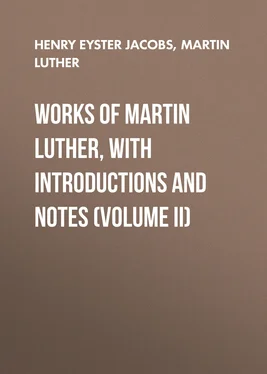Henry Eyster Jacobs - Works of Martin Luther, with Introductions and Notes (Volume II)
Здесь есть возможность читать онлайн «Henry Eyster Jacobs - Works of Martin Luther, with Introductions and Notes (Volume II)» — ознакомительный отрывок электронной книги совершенно бесплатно, а после прочтения отрывка купить полную версию. В некоторых случаях можно слушать аудио, скачать через торрент в формате fb2 и присутствует краткое содержание. Жанр: foreign_prose, foreign_religion, Философия, foreign_psychology, foreign_antique, на немецком языке. Описание произведения, (предисловие) а так же отзывы посетителей доступны на портале библиотеки ЛибКат.
- Название:Works of Martin Luther, with Introductions and Notes (Volume II)
- Автор:
- Жанр:
- Год:неизвестен
- ISBN:нет данных
- Рейтинг книги:3 / 5. Голосов: 1
-
Избранное:Добавить в избранное
- Отзывы:
-
Ваша оценка:
- 60
- 1
- 2
- 3
- 4
- 5
Works of Martin Luther, with Introductions and Notes (Volume II): краткое содержание, описание и аннотация
Предлагаем к чтению аннотацию, описание, краткое содержание или предисловие (зависит от того, что написал сам автор книги «Works of Martin Luther, with Introductions and Notes (Volume II)»). Если вы не нашли необходимую информацию о книге — напишите в комментариях, мы постараемся отыскать её.
Works of Martin Luther, with Introductions and Notes (Volume II) — читать онлайн ознакомительный отрывок
Ниже представлен текст книги, разбитый по страницам. Система сохранения места последней прочитанной страницы, позволяет с удобством читать онлайн бесплатно книгу «Works of Martin Luther, with Introductions and Notes (Volume II)», без необходимости каждый раз заново искать на чём Вы остановились. Поставьте закладку, и сможете в любой момент перейти на страницу, на которой закончили чтение.
Интервал:
Закладка:
Likewise St. Paul says in I Corinthians v: "If any man among you be a fornicator, or covetous, or an idolator, or a railer, or a drunkard, or an extortioner, with such an one keep not company, neither eat with him." [1. Cor. 5:11] Again he says in II Thessalonians iii: "If any man obey not our word by this epistle, note that man and have no company with him, that he may be ashamed." [2 Thess. 3:14] Again, John says in his second Epistle: "If any one come unto you, and bring not this doctrine, receive him not into your house, neither bid him God speed, and he that biddeth him God speed is partaker of his evil deeds." [2 John 10]
From all these sayings we learn how the ban is to be used. First, we should seek neither vengeance nor our own profit, as is at present the disgraceful practice everywhere, but only the correction of our neighbor. Second, the penalty should stop short of his death or destruction; or St. Paul limits the purpose of the ban to the correction of our neighbor, that he be put to shame when no one associates with him, and he adds in 11 Thessalonians iii: "Count him not as an enemy, but admonish him as a brother." [2 Thess. 3:15] But now the ruthless tyrants deal with men as though they would cast them down to hell, and do not in any wise seek their correction.
5. It may often happen that a person under the ban is deprived of the holy sacrament, and also of burial, and is nevertheless inwardly 59 59 Cf. p. 10.
secure and blessed in the fellowship of Christ and of all saints, signified in the sacrament. On the other hand, there are many who are not under the outward ban and who freely partake of the sacrament, but are nevertheless inwardly quite estranged and excommunicated from the fellowship of Christ; even though they be buried under the high altar in a golden pall with much pomp and singing and tolling of bells. Therefore, no one is to be judged, even if he be under the ban, especially if he has not been put under the ban for heresy or sin, but for the purpose of correction. For to put men under the ban for the sake of money or other temporal considerations is a new invention, of which the apostles and Christ knew nothing.
6. To put under the ban is not, as some think, to deliver a soul to Satan and deprive it of the intercession and of all the good works 60 60 See Vol. I, pp. 53, 163 ff.
of the Church. For where the true faith and love of God remain in the heart, there remains a real participation in all the possessions and intercessions of the Church, together with all the benefits of the sacrament, since the ban is and can be nothing else than exclusion from the external sacrament or from association with men. If I were cast into prison I would, of course, be deprived of the outward companionship of my friends, and yet not be deprived of their favor and friendship; so he that is put under the ban must relinquish the sacrament and association with men, but is not on that account cut off from their love, intercession and good works.
7. It is true that the ban, when it is rightly and deservedly applied, is a sign, an admonition and a chastisement, whereby the one under the ban should recognize that he himself has delivered his soul unto Satan by his transgression and sin, and has deprived himself of the fellowship of all the saints and of Christ. For by the penalty of the ban our mother, the holy Church, would show her dear son the awful consequences of sin and thereby bring him back from the devil to God. When an earthly mother rebukes and chastises her erring son, she does not give him over to the hangman or to the wolves, nor make a knave of him, but she restrains him and shows him by her chastisement that he is in danger of the hangman, and thus keeps him at home in his father's house. In the same way, when the spiritual power puts any one under the ban, it should be in this spirit: "Behold, thou has done this or that, whereby thou hast delivered thy soul unto the devil, deserved God's wrath, and deprived thyself of all Christian fellowship; thou art fallen under the inward spiritual ban in the sight of God and art unwilling to cease or to return. So then, I put thee also outwardly under the ban in the sight of men, and to thy shame I deprive thee of the sacrament and of fellowship with men, until thou come to thyself and bring back thy soul."
8. Let every bishop, provost or official 61 61 The officials were officers of the bishops' courts; see also below, p. 103.
, who uses the ban for any other purpose, take heed lest he put himself under the everlasting ban from which neither God nor any creature shall deliver him. There are none to whom the ban is more harmful and dangerous than those who apply it, even though it be laid quite justly and only on account of wrongdoing, for the reason that they seldom if ever have this object in view. Besides they go about it without fear and do not consider how perchance they themselves may be more worthy of a hundred bans in the sight of God, as the Gospel records of the servant who owed his Lord ten thousand pounds and yet would not have patience with his fellow servant who owed him a hundred pence. What will become of these miserable taskmasters, who for the sake of money have brought things to such a pass with their bans, often violently and unjustly imposed, that Turks and heathen have an easier life than Christians? It is very evident that many of them are under the ban in the sight of God, and are deprived of the blessing of the sacrament and of inward, spiritual fellowship, although they do nothing day and night but cite others to appear, harass them and put them under the ban, and deprive of the external sacrament those who are a thousandfold better inwardly and in the sight of God and are living in the spiritual fellowship of the sacrament. O miserable business! O terrible existence maintained by this abominable trade! I am not sure whether such publicans and officials were wolves before becoming officials or whether they are on the way to becoming wolves; their work is certainly wolves' work.
9. From this there follows the truth that the ban of itself ruins, condemns or harms no one, but seeks and finds the ruined and condemned soul for the purpose of bringing it back. For all chastisement is for the correction of sin; the ban is simply a chastisement and motherly correction; therefore it makes no one worse or more sinful, but is ordained solely to restore the inward spiritual fellowship when justly laid, or to deepen it when unjustly imposed. This is proved by St. Paul when he says in II Corinthians xiii: This I write to you according to the power which the Lord hath given me, to edification and not to destruction," [2 Cor. 13:10] And thus, when he rebukes him who had taken his step-mother to wife, he says in I Corinthians v: "I together with you deliver him unto the devil for the destruction of the flesh, that the spirit may be saved at the last day." [1 Cor. 5:5] Thus also in the passage quoted above he said: "We should not count him who is under the ban as an enemy, but admonish him as a brother, in order that he may be put to shame and not be lost." [2 Thess. 3:15] Nay, even Christ Himself, as man, had not the power to cut off and deliver a single soul to the devil, as He says in John vi: "Him that cometh to Me I will in no wise cast out, and this is the will of My Father Who sent Me, that I should not destroy or lose what He giveth Me." [John 6:37, 39] Again He says: "The Son of Man is not come to destroy, but to save men's souls." [Luke 9:56] If Christ Himself and all the apostles had no other power than to help souls, and have let behind them no other power in the Church, how dare the blind tyrants presume and boast in their presumption that they have power to curse, to condemn and to destroy, which power is even denied them by their own canon law; for in the Liber Sextus 62 62 In Vito, lib. V, tit. xi, c. I, Cum medicinalis .
, which treats of the sentence of excommunication, we read: "Since the ban is a medicine and not a poison, only a discipline, not a destructive uprooting, in so far as the one subjected to it does not despise it: therefore let every spiritual judge give diligence to prove himself one who seeks by the ban naught but to correct and to cure."
Интервал:
Закладка:
Похожие книги на «Works of Martin Luther, with Introductions and Notes (Volume II)»
Представляем Вашему вниманию похожие книги на «Works of Martin Luther, with Introductions and Notes (Volume II)» списком для выбора. Мы отобрали схожую по названию и смыслу литературу в надежде предоставить читателям больше вариантов отыскать новые, интересные, ещё непрочитанные произведения.
Обсуждение, отзывы о книге «Works of Martin Luther, with Introductions and Notes (Volume II)» и просто собственные мнения читателей. Оставьте ваши комментарии, напишите, что Вы думаете о произведении, его смысле или главных героях. Укажите что конкретно понравилось, а что нет, и почему Вы так считаете.












